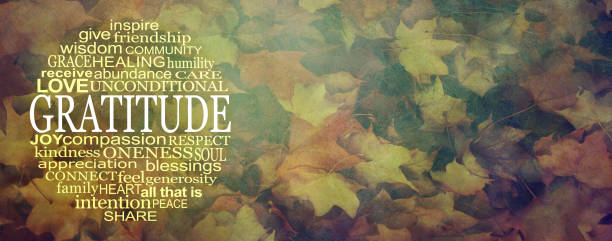Connection And Gratitude Are Key To Being Happy.

Connection and gratitude are key to being happy.
Gratitude, often regarded as a cornerstone of happiness, holds remarkable transformative power. It serves as a potent force capable of not only shaping our emotional landscape but also exerting profound effects on our physical and mental well-being.
Practicing gratitude has been shown to have a multitude of benefits. It can act as a healing balm, soothing the wounds of physical and mental illness. By shifting our focus from what we lack to what we have, gratitude helps cultivate a positive mindset that can improve our health, wealth, and relationships.
Moreover, gratitude has the remarkable ability to alter our outlook on life. It can imbue even the most challenging situations with a sense of meaning and purpose, fostering resilience in the face of adversity. By acknowledging the good in our lives, we open ourselves up to a world of possibilities, allowing us to experience joy and contentment in the present moment.

Connection and Gratitude Are Key to Being Happy
People are b*tches. They constantly complain about everything. As a child, I was foolish enough to believe what people said. I truly believed there were numerous legitimate reasons to bitch: the weather (most commonly), financial loss (runner-up), friends, husband or wife, children (me, in this case), civilization (or lack thereof), poor health, and so on. I assumed the arena had simply evolved into this state and that there was nothing we could do about it. It became known as “destiny” or something similar.
Instead of taking action, I relied on wishful thinking. I wasn’t asking for a better life; rather, I was seeking forgiveness from God for my sins. As I grew into a kind and helpful young woman, excelling in school and assisting at home, I found it increasingly challenging to think of faults to confess during our weekly confession. Despite my positive transformation, I was told that confession was necessary because people are inherently sinful.
The nuns at school came up with a system to assist us: they would “organize” our misdeeds for us. Every Wednesday, on confession day, they would give us a red paper listing our “confessions of the day.” I can still vividly imagine the priest, hidden away in his cramped, dark confessional, listening to the confessions of 600 young girls, hearing the same sins repeated endlessly with no apparent end in sight.
Growing up
As a child, I began to feel uneasy. I couldn’t reconcile the idea that life was simply about confessing sins that someone else had assigned to me, making me appear wicked. I hesitated to confess any additional transgressions I had genuinely repented for. I was reluctant to accept that I was responsible for my suffering and that my daily prayers wouldn’t alter anything.
When I reached the age of 21, I took a trip to Washington. During my time there, I met some fascinating people and had a wonderful experience, filled with sunshine and abundance—things that typically don’t lead to complaints, right? Growing up, I had learned that people usually complain when there’s something genuinely worth complaining about, like bad weather (too cold, too rainy), financial hardships, and so on. However, what I observed in Washington was quite eye-opening. Despite significantly increasing their income, my friends continued to complain—about the weather (which was too warm), the service (even though they had five maids), or how everything was just too perfect.
I then realized that the grumbling was no longer entirely motivated by any specific goals. I also noticed that the villagers, who had very little, weren’t complaining. I found this intriguing because despite having almost nothing, they wore smiles on their faces. On the other hand, we had everything and yet we were still grumbling. How could this be?
My comprehension of how unrelated the concerns were to the external circumstances became crystal evident. It became a mindset and a habit. I became curious about how this habit formed and began comparing the lifestyle in the neighborhood to our own. My way of life changed permanently once I discovered the reason behind it.

Differences that separate us
They and we are fundamentally different in two key aspects. Firstly, they have a strong social network that supports everyone in the community. They stick together as a cohesive unit and don’t ostracize individuals who don’t conform. In our society, however, anyone who deviates slightly from the norm is often relegated to an “institution.” These institutions serve as a gathering place for those who struggle to keep pace with society and inevitably fall behind. Most of these facilities are heavily fortified, designed to keep us from “seeing” that these individuals exist. They more closely resemble prisons than places of refuge.
Who are these individuals who don’t conform to our culture and are secluded behind walls so we can avoid dealing with them? They include the sick, the dangerous, those with intellectual disabilities or mental health issues, individuals who are unique or different, the infirm, those who are slower (often attending special schools), those who are challenging to manage (often attending specialized educational facilities), as well as the elderly and infirm (who are often placed in upscale nursing homes).
In Washington, people stay within their own neighborhoods, where they are well-connected and supported. Everyone has access to assistance and a robust social network. Social isolation is not a concern, even for those who have mobility issues or cognitive challenges. They form close-knit communities. I realized that one of the primary reasons for our excessive complaining is the sense of loneliness and isolation we feel inside.
The second difference is that each of those individuals is a part of something greater than themselves. They have a strong belief in a benevolent deity who watches over them. People devote significant time to performing rituals to please their gods and ensure good health and bountiful harvests in return.
“In this world, we are always a part of something new, something bigger.”
I considered these two variations in great conclusion that strengthening interpersonal relationships and a steady connection with something greater than ourselves are the two most important pillars of human happiness.
It’s essentially about “connection.” There are numerous connections among them, including their relationship with the cosmos. Along the way, I realized that certain things manifest more readily when we maintain our connections with each other and the universe. I started studying the laws of the universe and devoted a lot of energy to assisting one another and the universe. In fact, this has become the primary purpose of my existence.

The power of gratitude and connecting with the source
Many individuals believe they must tackle everything alone, feeling powerless and isolated. However, the truth is quite the opposite. You are guided and supported by something greater than your individual self. It’s essential to explore and nurture this connection as much as possible. Connect with the Source for as long as needed. By emulating the behavior of the individuals I had the privilege of meeting all those years ago, you can establish a genuine connection between yourself, the universe, and those around you without becoming overly dependent on them. This will allow you to express much more love to everyone around you, as you will never feel lonely again.
Living a “connected lifestyle” will help you let go of past grievances. Why bother complaining? Instead, replace your complaints with gratitude! Appreciate the universe for all your belongings and the miracles that continue to guide you. Thank everyone for the love you have received and will continue to receive in your life. Be genuine in your appreciation.
Do a simple hand gesture of gratitude for the smooth water coming from the tap. Many individuals spend up to six hours a day just to access a small amount of water, while others even perish from thirst. Be grateful for the light you can easily switch on with a flick. Large parts of the world have to get by without electricity! Give thanks for the variety of meals you have access to each day; many people rely on one scanty meal per day or are truly starving.
This world offers so much to celebrate.
There is much to celebrate and reflect upon. When I turned 21, I found myself in a contrasting situation. My friends in Washington, who lived in luxury, often found reasons to complain. In stark contrast, my other friends, who had very little, seemed to find joy in simple things, express gratitude, and be content with life’s minor pleasures. This stark difference made me reflect on the nature of happiness and what truly brings fulfillment in life.
Everything lies within the mind. Happiness and gratitude are states of mind and ways of being. It is unrelated to the situation. The attitude is one of thanks.
Do you have any questions or concerns at this stage? Please feel free to share your feedback in the space provided below. You can reach out to me at any time.
Related: Happiness: The Ultimate Birthright
Are You Looking For The Butterfly Of Mystical Happiness? – It’s Beautiful
Are You Able To Accept Happiness? 11 Practical Actions You Can Do To Make It Happen
“How To Reclaim Your Life’s Happiness By Demolishing The #1 Self-Esteem Killer”
Kiersti writes on self-love and personal development professionally. Over the past ten or so years, she has studied self-love and personal growth. Visit https://womansdailyneeds.com/ to learn more about what she does, and like her on Facebook at https://facebook.com/womansdailyneeds to keep up with her.

